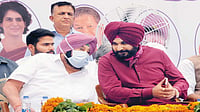He worked closely with Rajiv Gandhi in the 1980s to usher in India’s telecom revolution and is now part of Congress president Rahul Gandhi’s team of communication strategists for the polls. Lately though, 77-year-old Sam Pitroda’s comments on the Balakot air strikes have been lapped up by Prime Minister Narendra Modi to sway the poll rhetoric back to the BJP’s emotive election plank of nationalistic pride. In conversation with Puneet Nicholas Yadav, Pitroda, the US-based technology entrepreneur and Congress’s transient political advisor, explains why he returned to India, what, in his opinion, led to the fall of the UPA in 2014 and why the BJP must be voted out. Excerpts:
You have been a frequent visitor in Indian politics. You were a key figure during the Rajiv Gandhi-era in the mid-1980s and then we rarely heard of you till the UPA came to power. Then again for a couple of years we didn’t see you and now you are back. Why?
I think the Congress today is at a point where we need to put together all our resources to get back to power. I worked with Rajiv Gandhi for 10 years and then, when we lost the government, naturally, I went back to put my personal life in order. When the Manmohan Singh government came in, I thought I could make a contribution. Now, I believe it is my duty to help the party return to power.
Why do you think the party lost in 2014?
I don’t think we did anything wrong. The UPA government ushered in unprecedented growth; the country grew at 8 per cent during those years. Dr Manmohan Singh was low key but he was a great prime minister. Whether it was MNREGA or Aadhaar or Right to Education or the Knowledge and Innovation commissions—we had a lot of stuff that we got done. But we didn’t talk enough about it and our communication went wrong. Also, I think, the people saw three power centres—Sonia Gandhi, Dr Singh and Rahul Gandhi—and the result was that people got confused and thought, ‘where do we have to align’? I believe that in every election, corruption and lies sell. Lies sell well. All you need to do is give false promises. The BJP did that. It made tall promises but never did anything; came up with all sorts of allegations but never proved anything. I hope people, this time around, will realise that the BJP made hollow promises and they lied.
You admit there was a perception of power centres and confusion because of it. Why didn’t the party do anything to dispel that perception? The then Opposition constantly attacked Dr Manmohan Singh for being a puppet prime minister.
Whatever you may say, Dr Singh was a great prime minister. He delivered. I don’t think the party failed him. It is a lie to say that he was a puppet prime minister or an inefficient, reluctant prime minister. But Manmohan Singh was not the one who would say—wait a minute, I am going to fight this lie.
Wasn’t that wrong?
No, I wouldn’t have done that too. If you jack it up, they would jack it up too. They have an army of paid people to lie. You are only an individual, how do you fight?
Rahul Gandhi too faces an image trap. Someone calls him a Pappu, others call him with some other name. He claims this is the creation of the BJP. Do you think he lacked the commitment needed to lead the party?
That’s a question only Rahul can answer. But in my personal view, you have to look from his perspective. When Dr Manmohan Singh was in power, he (Rahul Gandhi) made a conscience decision to not interfere. If he interfered he would have undermined the PM… After 2014, he said I want to take a year or two to become president of the party…You and I may have a different idea; he may have a different idea. So from his perspective, I think he did the right thing—perhaps a little late from our perspective.
Rahul led a dozen of state elections campaigns where the party lost.
First of all, Congress is a party of 130 years. It has deep roots in all parts of India. It has been in power for most of the time after Independence. It’s ok and it’s good for democracy to hand over power to someone else for a while. I think it is expected and nothing to worry about. This is what democracy is about and we have to respect that and move on. The real problem begins when the other party begins to attack the core fundamental values and the idea of India. When you get into a position where you want to capture democracy and curb freedom, divide communities and at the same time, not perform…look at the past five years; we have not created any jobs, there is farmer distress, economy is in doldrums…nothing has worked. A lot of the promises Modi made—we’ll bring back black money: zero; we’ll create 100 million jobs: zero; we’ll improve productivity: nothing; we’ll create industries: zero. This is where the pain is. The pain is not about national security, believe me. People know that our forces, our army is very good and people trust them. Give them (the army) autonomy and flexibility but don’t take credit for their work.
Your comments on Pulwama have made you a favourite target of Narendra Modi and the BJP. Do you think you could have used better judgement?
I don’t think so. I said what I believed and I would say so even now. I, as a citizen, am entitled to ask questions. It is my moral responsibility as a public figure.
But haven’t you given ammunition to the BJP. They say you are talking the language of Pakistan.
Even if I breathe, they can say I am breathing Pakistani air. They do so because they lie, they manage headlines. They are liars, petty fellows who are desperate. Any decent person would look at comments in totality and then make sense instead of picking things out of context and going gangbuster on it and spending millions to promote it.
The Congress manifesto promises a slew of reforms. Do you think the promises are implementable and people will believe them given their experience with promises of the past five years?
I can tell you, based on my experience; we will implement 80 per cent of the promises. I can’t guarantee 100 per cent because things do happen. Politically, it is right to say we will deliver 100 per cent but reality is different. If we deliver 80 per cent, it would be a huge success. When we come to power, within the first month we would want to sit down with each of the ministers and say that your performance will be based on these deliverables. We haven’t done that systematically.
In a coalition, can you act that way?
We have to discuss that with our coalition partners and tell them that if you are taking a certain ministry, we have promised this and would you like to negotiate the promise. But once this negotiation is done, the nation would be watching you.
You were the brains behind the telecom revolution back in the 1980s. What in your view is the next step now?
I used to ask this question myself and that is why I came back (during the UPA government) to work on knowledge. I think knowledge and innovation are real challenges for the country. Knowledge isn’t just about education. We looked at five aspects of knowledge: (a) access to knowledge; (b) knowledge concepts; (c) creation of knowledge; (d) knowledge application and (e) knowledge in government. So knowledge revolution needs to be revisited.
Why didn’t you do that during UPA? Under you, the Knowledge Commission, it churned out over 300 reports. Nothing happened on most of them.
Not true but yes, that is the general impression. The biggest contribution that people have not noticed even now is the national knowledge network where we connected 1,100 nodes to 40 gigabyte bandwidth to connect all our universities, libraries, R&D installations. That network is today the core of Digital India. Digital India cannot work without that network. It was built quietly. It works and people are using it in large numbers. No one ever paid any attention to it. Similarly vocational training—Skill India—came out of the Knowledge Commission.
Why did you fail to tell the people that your government did all this?
It’s simple. We did not spend management time in talking about our work. We had a job to get done. We did not have the time to talk about it. It is not morally right. Somebody else today may say the opposite and spend 100 per cent of their time promoting and not doing their job. That’s not me and that’s not us (in the Congress).


























